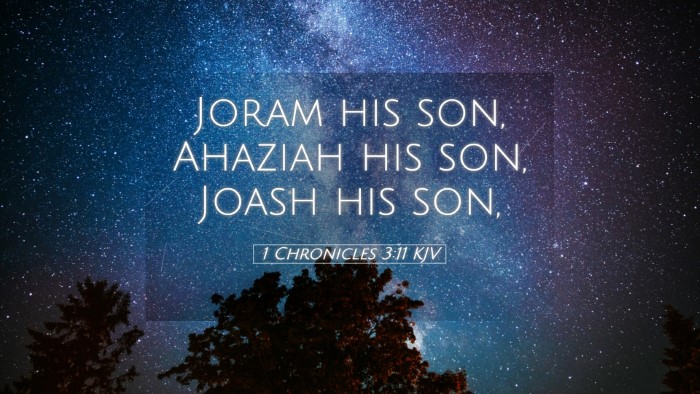Commentary on 1 Chronicles 3:11
Verse Context: 1 Chronicles 3:11 states, “And Manasseh his firstborn, and Amon the second, and Josiah the third.” This verse is a part of the genealogies listed in the Chronicler’s account, specifically focusing on the lineage of David’s descendants.
General Overview
This verse serves as a key point in tracing the lineage of the Davidic line, highlighting the importance of each descendant listed. The genealogical records in 1 Chronicles serve to legitimize the continuing covenantal promises made by God to David and his descendants. Understanding this verse requires insight into the historical and theological implications of each name mentioned.
Insights from Matthew Henry
Matthew Henry emphasizes the significance of Josiah in this lineage, viewing him as a righteous king who renewed the covenant with God and led Judah back to proper worship. Henry notes that the mention of Josiah illustrates God's faithfulness in preserving a remnant committed to His ways, despite the many challenges faced by Israel during this period.
Divine Faithfulness: Henry highlights God’s providence in maintaining a faithful line through which the promised Messiah would come. He denotes the importance of lineage in Jewish culture and observes how each king's reign contributed to the understanding of God's dealings with His people.
Insights from Albert Barnes
Albert Barnes provides insight into the historical setting of the kings mentioned. He remarks on Manasseh’s tumultuous reign characterized by idolatry and its subsequent repentance, and Amon’s brief and evil reign which ultimately allowed Josiah to emerge as a reformer. Barnes sees a pattern of rebellion and restoration centering around these kings.
Key Themes:
- Restoration: The turning points in these reigns point to God's readiness to restore His people when they turn back to Him.
- Legacy of Leadership: The hereditary nature of kingship emphasizes the responsibility leaders have to guide their people towards Yahweh.
- Judgment and Mercy: The mention of these kings reaffirms the theme of divine judgment for iniquity but also highlights God's merciful willingness to forgive and rehabilitate His people.
Insights from Adam Clarke
Adam Clarke offers a detailed examination of each king mentioned. He particularly focuses on the role of Josiah as a pivotal figure in the history of Judah. Clarke argues that Josiah's reforms led to significant religious revival, which is noteworthy given the backdrop of moral decay created by his predecessors.
Historical Significance: Clarke notes that the timeline of these kings reflects the broader historical shifts within Judah, where idolatry had often overshadowed the worship of the true God. He provides context on how each king’s reign contributed to or detracted from the longevity and faithfulness of the covenant community.
Theological Reflections
From a theological perspective, 1 Chronicles 3:11 serves to reinforce the importance of godly leadership and the implications of a spiritual heritage. The verse invites pastors and scholars to reflect upon the lineage that links the present community of faith with their historical predecessors.
Key Theological Insights:
- Continuity of God's Plan: This genealogical record is a testament to God’s unwavering plan throughout the generations, culminating in Christ.
- The Importance of Repentance: The turbulent reigns of Manasseh and Amon showcased that God can work through even the most challenging circumstances.
- Community and Accountability: The blessings or curses experienced by a community can often be reflective of its leaders’ fidelity to God’s commandments.
Application for Today
For contemporary readers and leaders within the church, this passage underscores several critical applications. The legacy of leadership should compel those in authority to steward their influence responsibly, leading their communities towards righteousness.
Modern Day Implications:
- Leadership Integrity: Church leaders are reminded to maintain integrity and accountability, considering how their actions affect the community of faith.
- Importance of Restoration: The journey of Manasseh demonstrates that no one is beyond redemption; thus, churches should foster environments of grace where repentance and restoration are encouraged.
- Covenantal Community: Just as the kings were accountable to God and their people, modern believers are called to live in covenant community, reflecting God's justice and mercy.
Conclusion
In conclusion, 1 Chronicles 3:11, while a simple record of genealogical succession, invites profound reflection on themes of leadership, divine faithfulness, repentance, and the continuity of God’s redemptive plan. It serves as a reminder of the weighty responsibility held by those in leadership and the impact their lives have on the faith journey of their communities.


